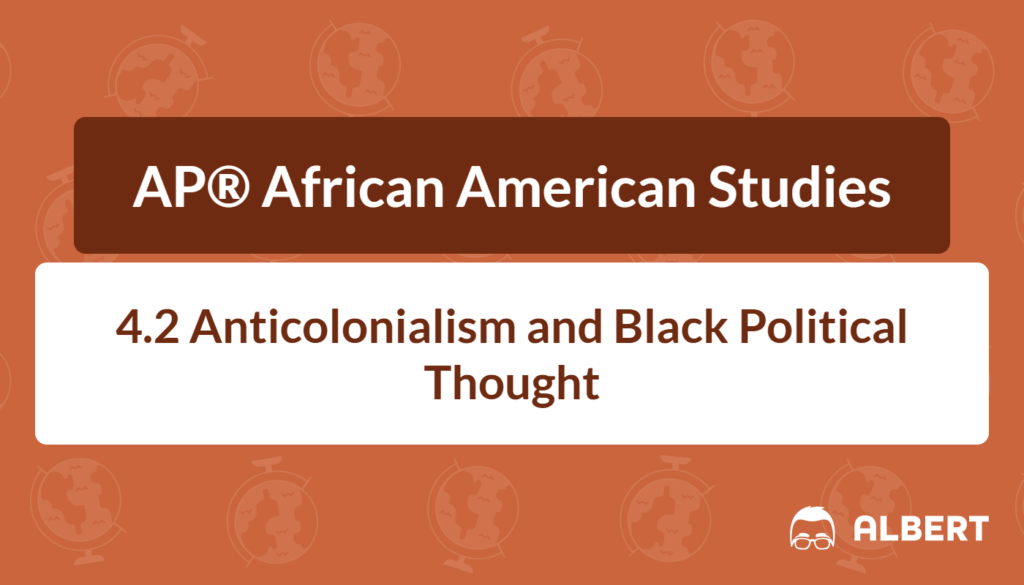What We Review
Introduction
Anticolonialism is a political movement that fights against colonial rule and champions independence for oppressed nations. In the context of Black political thought, this concept is especially important to understanding struggles for self-determination around the world. From the mid-1940s to the 1970s, the Black Freedom Movement in the United States aligned with global anticolonial efforts to demand equality and autonomy.
Studying anticolonialism reveals how people banded together to challenge discriminatory systems. Furthermore, examining the Black Freedom Movement offers insight into how individuals worked tirelessly to end segregation, uplift African American communities, and celebrate Black identity. This movement was not isolated to the United States. Instead, it connected activists and leaders across the African diaspora, creating lasting ties that continue to influence social justice movements today. Understanding how these events developed provides a key foundation for appreciating present-day activism and policy changes.
Understanding Anticolonialism
Anticolonialism involves active resistance to foreign control, highlighting a desire for cultural pride and political independence. Historically, many nations in Africa, Asia, and the Americas were colonized by European powers that enforced policies suppressing local traditions, languages, and social structures.
As colonized people gained awareness of their rights, anticolonial movements emerged to challenge oppressive systems. For example, many African nations fought for freedom from European rule during the mid-1900s. Around the same time, several Asian and Caribbean territories also sought independence. These efforts reflected a shared recognition that colonial systems had ravaged entire communities for centuries.
However, anticolonial ideas were not limited to politics. Creative expressions such as music, literature, and art also played a foundational role in uniting people. Therefore, anticolonialism became a broad cultural shift as well as a political stance. It helped develop resistance strategies that would deeply influence the Black Freedom Movement in the United States.
The Black Freedom Movement: 1940s – 1970s
The Black Freedom Movement encompasses efforts by African Americans to end racial discrimination and achieve social, political, and economic equality. Spanning from the 1940s to the 1970s, it included diverse groups and campaigns that worked to dismantle segregation, champion voting rights, and build a proud Black identity.
- Civil Rights Movement (1950s–1960s): This phase targeted segregation laws known as Jim Crow. Leaders such as Dr. Martin Luther King Jr. pushed for nonviolent direct action, including boycotts, marches, and legal challenges. Their collective work led to crucial legislation, such as the Civil Rights Act of 1964.

- Black Power Movement (late 1960s–1970s): This phase promoted self-determination, racial pride, and cultural awareness. Supporters emphasized the need to control Black-owned institutions, celebrate cultural identity, and practice self-defense if necessary.
Overview of The March on Washington (1963)
- The March on Washington drew over 200,000 people to the nation’s capital to advocate for civil and economic rights.
- Dr. Martin Luther King Jr. delivered his famous “I Have a Dream” speech, which called for an end to racism.
- The event increased public support for civil rights legislation and directly influenced lawmakers to address racial inequalities.
From boycotts to protests, these campaigns shaped public perception and laws. They also prepared the ground for broader international connections, linking the experiences of Black Americans to anticolonial movements worldwide.
Diasporic Solidarity Across the African Diaspora
Diasporic solidarity refers to the unity and shared purpose felt by people of African descent around the world. This sense of global community became vital during the twentieth century as African Americans reached out to support nations seeking freedom from colonial rule. In turn, newly independent countries in Africa inspired African Americans to strengthen their own demands for equality.
Transnational activism emerges when people collaborate across borders for a common cause. Leaders and intellectuals met with African governments, social activists, and cultural figures to share ideas. Martin Luther King Jr., Malcolm X, and Maya Angelou were among those who visited Africa, recognizing a bond forged by common histories of oppression and aspirations for liberty.
Ghana’s Independence (1957)
- Ghana became the first Sub-Saharan African nation to gain independence from British colonial rule.
- Its victory inspired a wave of optimism across Africa, leading many other countries to push for independence.
- African American figures such as Martin Luther King Jr. and Malcolm X visited Ghana, offering support and standing in solidarity with fights against colonialism.
- Writer Maya Angelou and attorney Pauli Murray also connected with Ghana, finding new perspectives for activism back in the United States.
- W.E.B. Du Bois, respected historian and sociologist, eventually moved to Ghana, underscoring the depth of this global unity.
Required Sources and Their Historical Context
- Martin Luther King Jr. Interview During Visit to Newly Independent Ghana on Invitation from Kwame Nkrumah, 1957
- Dr. King’s visit highlighted the excitement surrounding Ghana’s independence. His interview during this trip underscored the link between African liberation and the Black Freedom Movement in the United States.
- Joe Louis During Visit of Black Business and Media Leaders to Havana, Cuba, 1960
- This journey showcased the efforts to build stronger ties between African Americans and international communities. Attendees aimed to create business opportunities and vacation spaces free from Jim Crow discrimination.
- Maya Angelou, Julian Mayfield, and Others Petition Outside the United States Embassy in Accra, Ghana, 1963
- This protest illustrated the active role that African American artists and intellectuals played in African politics. By standing outside their own embassy, they showed a commitment to diasporic solidarity and resistance to injustice, both at home and abroad.
These sources reveal how leading figures saw their struggles for civil rights as part of a global fight against colonial rule and racial oppression. Their historical context reflects the era’s optimism and determination to confront inequality wherever it was found.
The Role of Joe Louis and International Engagement
Joe Louis, a heavyweight boxing champion, played a surprising yet important role in international engagement. Beyond the boxing ring, he used his fame to bring attention to issues affecting African Americans, including the negative effects of segregation.
In 1960, Joe Louis joined a largely African American delegation to Havana, Cuba. The goal was to nurture a tourism industry that welcomed Black travelers without subjecting them to Jim Crow laws. This trip aimed to expand options for African Americans, who often faced discrimination in hotels, restaurants, and public facilities back home.
Joe Louis’s Journey to Cuba
- Louis traveled with Black business owners, journalists, and community leaders.
- They met with Cuban officials and stakeholders to explore tourism opportunities free from U.S. segregation.
- Discussions emphasized the growing economic power of African American consumers and their desire for fair treatment abroad.
- Although the project met obstacles, it drew significant media coverage, sparking dialogues about racism and international collaboration.
Impact of Diasporic Solidarity on Black Politics
Shared struggles against anti-Black racism have united communities across continents. When African Americans reached out to support African nations seeking liberation, it boosted the global visibility of the Black Freedom Movement. The message was clear: Oppression in one region resonated across the diaspora.
This unity influenced Black politics in several ways:
- African American leaders gained new strategies after interacting with independence movements.
- Transnational alliances encouraged global media to focus on issues of racism and inequality.
- Ongoing collaboration reminded placed communities that they were part of a worldwide movement, not just groups in single nations.
The Year of Africa (1960)
- In 1960, 17 African countries declared independence from colonial powers.
- African Americans celebrated these triumphs and saw them as validation for civil rights campaigns in the U.S.
- Diasporic solidarity grew stronger, as African nations also welcomed visits by U.S. activists.
- Black media outlets covered these independence ceremonies, linking them to the broader Black Freedom Movement.
By intertwining domestic activism with African independence movements, Black Americans and Africans exchanged knowledge, methods, and moral support. Therefore, the fight for civil rights within the United States became part of a larger tapestry of liberation struggles worldwide.
Ongoing Relevance of Anticolonialism and Diasporic Solidarity
Anticolonial thought remains significant because it continues to guide modern social justice movements. Many activists look to past leaders such as Kwame Nkrumah of Ghana or Martin Luther King Jr. in the United States for inspiration. Their work demonstrates how determination, global alliances, and organized strategies can dismantle oppressive practices over time.
Today, these ideas help shape debates about economic development, cultural expression, and political representation. Ongoing movements against discrimination often draw on the history of diasporic solidarity. Activists see how unity across national borders can amplify their voices and place pressure on decision-makers.
While new challenges arise, the lessons of the Black Freedom Movement encourage long-term cooperation across communities. Modern campaigns connect social media, cultural exchanges, and policy reforms, continuing the legacy of anticolonial resistance in fresh and innovative ways.
Conclusion
Anticolonialism and the Black Freedom Movement are essential to understanding the roots of global racial justice efforts. The struggle to end colonial control directly influenced African Americans’ campaigns for equality. Through diasporic solidarity, individuals and groups formed lasting bonds that increased the reach and impact of their activism.
From Martin Luther King Jr.’s celebrated trip to newly independent Ghana, to Joe Louis’s initiative in Havana, to Maya Angelou’s stand in Accra—these milestones exemplify how shared struggles transcend borders. The spirit of unity that emerged during the mid-twentieth century continues to inform today’s fight against discrimination and oppression. Recognizing this history equips readers with deeper insight into how collective effort and community building can shape a more equitable future for all.
Quick Reference Chart: Key Terms and Definitions
| Term | Definition |
| Anticolonialism | A political movement opposing colonial rule and advocating for independence and self-determination. |
| Black Freedom Movement | Efforts from the mid-1940s to the 1970s to end racial discrimination and promote equality for Black Americans. |
| Diasporic Solidarity | A sense of unity and shared purpose among people of African descent worldwide, often in response to injustice. |
| Civil Rights Movement | A movement aimed at ending segregation and discrimination against African Americans, leading to key legislation. |
| Black Power Movement | A movement emphasizing racial pride, cultural autonomy, and self-defense within the Black community. |
These concepts reveal how people came together to challenge unjust power structures and support one another across continents. Their legacy persists, shaping present-day activism and inspiring new champions for equity and liberation.
Sharpen Your Skills for AP® African American Studies
Are you preparing for the AP® African American Studies test? We’ve got you covered! Try our review articles designed to help you confidently tackle real-world AP® African American Studies problems. You’ll find everything you need to succeed, from quick tips to detailed strategies. Start exploring now!
Need help preparing for your AP® African American Studies exam?
Albert has hundreds of AP® African American Studies practice questions, free response, and full-length practice tests to try out.









